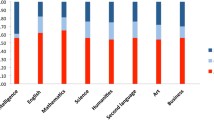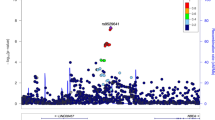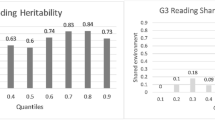Abstract
Education has been suggested to be possibly the most consistent, robust, and durable method available for raising intelligence, but little is known about the genetic and environmental interplay underlying this association. Therefore, we investigated how school achievement, as measured by grade point average in lower secondary school at 15 years of age, moderated intelligence variation in young adulthood. The sample consisted of all Danish male twin pairs who had left lower secondary school since 2002 and appeared, typically at age 18, before a draft board through 2015 (N = 2660). Shared environmental variance unique to intelligence (10% of total variance) was found to be greater among individuals with poor school achievement. However, school achievement did not moderate the genetic influences or the non-shared environmental influences on intelligence. We discuss the implications of this in light of the constraints imposed by the statistical models we used.





Similar content being viewed by others
Data availability
All code is available from the corresponding author on request.
Change history
04 January 2022
A Correction to this paper has been published: https://doi.org/10.1007/s10519-021-10098-0
References
Akaike H (1983) Information measures and model selection. Bull Int Stat Inst 50:277–290
Balke-Aurell G (1982) Changes in ability as related to educational and occupational experience. Acta Universitatis Gothoburgensis, Göteborg
Belsky DW, Moffitt TE, Corcoran DL, Domingue B, Harrington H, Hogan S, Houts R, Ramrakha S, Sugden K, Williams BS, Poulton R, Caspi A (2016) The genetics of success: how single-nucleotide polymorphisms associated with educational attainment relate to life-course development. Psychol Sci 27(7):957–972. https://doi.org/10.1177/0956797616643070
Binet A, Simon T (1905) Méthodes nouvelles pour le diagnostic du niveau intellectuel des anormaux. L’Année Psychologique 11(1):191–244. https://doi.org/10.3406/psy.1904.3675
Ceci SJ (1991) How much does schooling influence general intelligence and its cognitive components? A reassessment of the evidence. Dev Psychol 27(5):703–722. https://doi.org/10.1037/0012-1649.27.5.703
Christiansen L, Frederiksen H, Schousboe K, Skytthe A, von Wurmb-Schwark N, Christensen K, Kyvik K (2003) Age- and sex-differences in the validity of questionnaire-based zygosity in twins. Twin Res 6(4):275–278. https://doi.org/10.1375/136905203322296610
Deary IJ, Johnson W (2010) Intelligence and education: causal perceptions drive analytic processes and therefore conclusions. Int J Epidemiol 39(5):1362–1369. https://doi.org/10.1093/ije/dyq072
Falconer DS, Mackay TFC (1989) Introduction to quantitative genetics, 4th edn. Pearson Education Limited, London
Gustafsson J-E (2001) Schooling and intelligence: effects of track of study on level and profile of cognitive abilities. Int Educ J 2:166–186
Hegelund ER, Grønkjær M, Osler M, Dammeyer J, Flensborg-Madsen T, Mortensen EL (2020) The influence of educational attainment on intelligence. Intelligence 78:101419. https://doi.org/10.1016/j.intell.2019.101419
Husén T, Tuijnman A (1991) The contribution of formal schooling to the increase in intellectual capital. Educ Res 20(7):17–25. https://doi.org/10.3102/0013189X020007017
Johnson W, Deary IJ, Iacono WG (2009a) Genetic and environmental transactions underlying educational attainment. Intelligence 37(5):466–478. https://doi.org/10.1016/j.intell.2009.05.006
Johnson W, Deary IJ, McGue M, Christensen K (2009b) Genetic and environmental transactions linking cognitive ability, physical fitness, and education in late life. Psychol Aging 24(1):48–62. https://doi.org/10.1037/a0013929
Johnson W, Deary IJ, Silventoinen K, Tynelius P, Rasmussen F (2010) Family background buys an education in Minnesota but not in Sweden. Psychol Sci 21(9):1266–1273. https://doi.org/10.1177/0956797610379233
Krapohl E, Plomin R (2016) Genetic link between family socioeconomic status and children’s educational achievement estimated from genome-wide SNPs. Mol Psychiatry 21(3):437–443. https://doi.org/10.1038/mp.2015.2
Ministry of Education (2017) 7-point grading scale. https://eng.uvm.dk/general-overview/7-point-grading-scale
Ministry of Higher Education and Science, Ministry for Children, Education and Gender Equality, & Ministry of Culture (2016) The Danish education system. Ministry of Higher Education and Science
Mortensen EL, Reinisch JM, Teasdale TW (1989) Intelligence as measured by the WAIS and a military draft board group test. Scand J Psychol 30(4):315–318. https://doi.org/10.1111/j.1467-9450.1989.tb01094.x
Novo A, Calixto JA (2009) Academic achievement and/or educational attainment—the role of teacher librarians in students’ future: Main findings of a research in Portugal. In: Preparing Pupils and Students for the Future: School Libraries in the Picture. 38th Annual Conference of the International Association of School Librarianship, Padua
OECD (2012) Grade expectations: how marks and education policies shape students’ ambitions. OECD Publishing, Pisa
Purcell S (2002) Variance components models for gene–environment interaction in twin analysis. Twin Res 5(6):554–571. https://doi.org/10.1375/136905202762342026
Raftery AE (1995) Bayesian model selection in social research. Sociol Methodol 25:111–163. https://doi.org/10.2307/271063
Ritchie SJ, Tucker-Drob EM (2018) How much does education improve intelligence? A meta-analysis. Psychol Sci 29(8):1358–1369. https://doi.org/10.1177/0956797618774253
Rowe DC (2003) Assessing genotype-environmental interactions and correlations in the post-genomic era. In: Plomin R, DeFries JC, Craig IW (eds) Behavioral genetics in the post-genomic era. American Psychological Association, Washington, pp 71–99
Snow RE (1996) Aptitude development and education. Psychol Public Policy Law 2(3–4):536–560. https://doi.org/10.1037/1076-8971.2.3-4.536
Strenze T (2007) Intelligence and socioeconomic success: a meta-analytic review of longitudinal research. Intelligence 35(5):401–426. https://doi.org/10.1016/j.intell.2006.09.004
Teasdale TW (2009) The Danish draft board’s intelligence test, Børge Priens Prøve: psychometric properties and research applications through 50 years. Scand J Psychol 50(6):633–638
The Defence Command (2017) Statistiske oplysninger [Statistical information]. The Defence Command
The Highland Council (2020) Guidance on being educated out-with the peer group including deferred and early entry to school. The Highland Council
Thomson S (2018) Achievement at school and socioeconomic background—an educational perspective. NPJ Sci Learn 3(1):1–2. https://doi.org/10.1038/s41539-018-0022-0
Trzaskowski M, Harlaar N, Arden R, Krapohl E, Rimfeld K, McMillan A, Dale PS, Plomin R (2014) Genetic influence on family socioeconomic status and children’s intelligence. Intelligence 42(100):83–88. https://doi.org/10.1016/j.intell.2013.11.002
Verhulst B, Prom-Wormley E, Keller M, Medland S, Neale MC (2019) Type I error rates and parameter bias in multivariate behavioral genetic models. Behav Genet 49(1):99–111. https://doi.org/10.1007/s10519-018-9942-y
Winship C, Korenman S (1997) Does staying in school make you smarter? The effect of education on IQ in The Bell Curve. In: Devlin B, Fienberg SE, Resnick DP, Roeder K (eds) Intelligence, genes, and success: scientists respond to The Bell Curve. Springer, New York, pp 215–234
Zavala C, Beam CR, Finch BK, Gatz M, Johnson W, Kremen WS, Neiderhiser JM, Pedersen NL, Reynolds CA (2018) Attained SES as a moderator of adult cognitive performance: testing gene–environment interaction in various cognitive domains. Dev Psychol 54(12):2356–2370. https://doi.org/10.1037/dev0000576
Funding
This research did not receive any specific grant from funding agencies in the public, commercial, or not-for-profit sectors.
Author information
Authors and Affiliations
Contributions
All authors contributed to the study conception and design. Data preparation and analysis were performed by Emilie Rune Hegelund. The first draft of the manuscript was written by Emilie Rune Hegelund and all authors commented on previous versions of the manuscript. All authors read and approved the final manuscript.
Corresponding author
Ethics declarations
Conflict of interest
Emilie Rune Hegelund, Erik Lykke Mortensen, Trine Flensborg-Madsen, Jesper Dammeyer, Kaare Christensen, and Wendy Johnson declare that they have no conflict of interest.
Ethical approval
According to Danish legislation, no ethics approval is needed for register-based studies, but the study was approved by the Danish Data Protection Agency.
Informed consent
Not applicable.
Additional information
Publisher's Note
Springer Nature remains neutral with regard to jurisdictional claims in published maps and institutional affiliations.
Edited by Chandra Reynolds.
Rights and permissions
About this article
Cite this article
Hegelund, E.R., Mortensen, E.L., Flensborg-Madsen, T. et al. The Moderating Influence of School Achievement on Intelligence in Young Adulthood. Behav Genet 51, 45–57 (2021). https://doi.org/10.1007/s10519-020-10027-7
Received:
Accepted:
Published:
Issue Date:
DOI: https://doi.org/10.1007/s10519-020-10027-7




